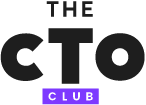13 Best License Management Software Shortlist
After a thorough evaluation, I've curated a list of the 13 best license management software:
- LicenceOne - Best with an autopilot invoice collector
- OpenLM - Best for deep insights with its powerful analytic tools
- Snow - Best for large-scale enterprises seeking comprehensive coverage
- Coreview - Best for Office 365 license management and reporting
- LicenseSpring - Best for software developers needing custom licensing solutions
- Soraco - Best for small businesses wanting affordability without compromising functionality
- Altair - Best for dynamic data center and cloud environments
- Invgate - Best for inventory tracking and PC management
- 10Duke - Best for cloud-based licensing and user authentication
- AssetSonar - Best for asset tracking and lifecycle management
- ManageEngine ServiceDesk Plus - Best for IT service desk integration
- Sentinel Software License Management - Best for flexibility in deployment options
- Freshservice - Best for integrating license management with other ITSM processes
I’ve experienced how managing software licenses can be complex, whether using on-premise solutions or Software as a Service (SaaS). It's essential to maintain the correct number of requests, avoid using unlicensed software, and keep track of license keys and expiry dates. License management software can help with all of these tasks. These tools offer a unified platform to manage all types of software licenses. Some are open-source, while others come with integrated help desks or configuration management databases (CMDB) to simplify endpoint management.
Dealing with software licenses can be tricky, especially when multiple software vendors and licensing models control all your requests. This software replaces manual tracking and reduces risk while ensuring compliance. It makes tracking expiry dates easier and manages multiple charges from different vendors.
What is License Management Software?
License management software is critical for organizations to track, control, and document their software licenses. IT managers, IT admins, software developers, and business leaders alike rely on these systems to ensure compliance with software usage terms, optimize their software investment by preventing over-provisioning, and avoid hefty fines that can occur due to software license non-compliance.
In essence, license management software provides an efficient way to manage and consolidate a company's software licenses across the board, contributing to better software resource allocation and streamlined operational processes.
Overviews of the 13 Best License Management Software
1. LicenceOne - Best for small businesses desiring an easy setup solution
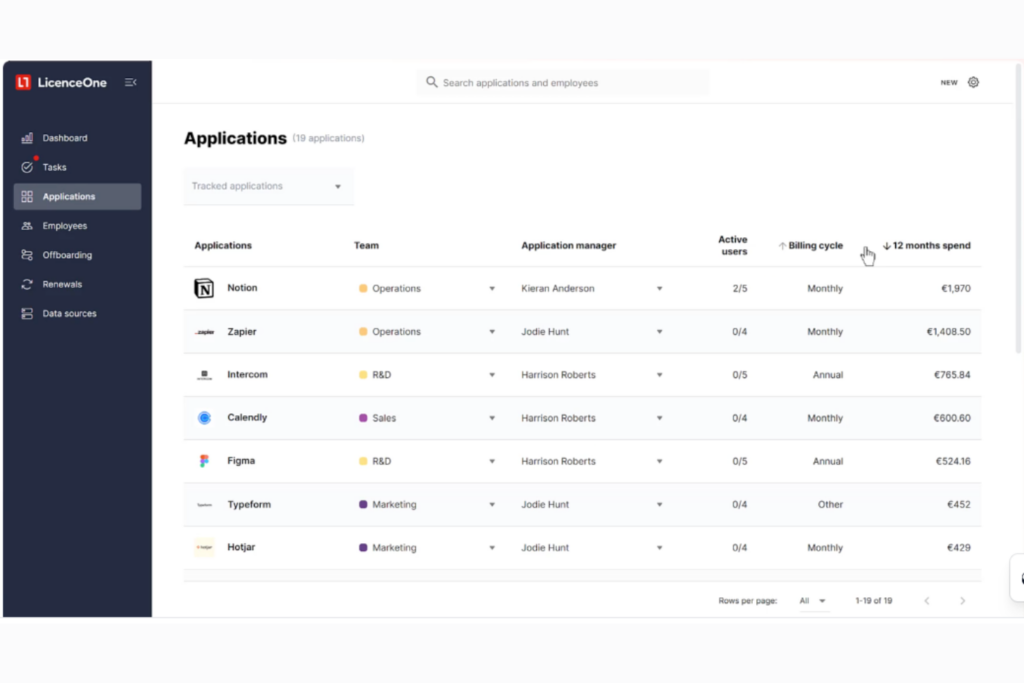
LicenceOne is a license management platform that analyzes your team's software spending to spot opportunities for savings. It pulls data to detect how many users you're paying for, your team's login activity, and more to give you smart recommendations about how you can ease up your tech stack spend.
Why I Picked LicenceOne:
This platform earned its spot on my list both because of its comprehensive coverage—it can sync with over 12,000 data sources—but also because of its automation capabilities. For example, you can easily manage an employee's access to multiple tools in one place. This makes the IT aspect of onboarding and offboarding staff a breeze. Additionally, their browser extension provides very accurate data for user login activity. This reveals in no time which licenses are not being used and helps fight against shadow IT on both paid and free SaaS.
Standout Features & Integrations:
Some of the features that make LicenceOne stand out are its enhanced security safeguards. The software boasts TLS 1.3 encryption both for data that's in transit and at rest. And being a European company, the data security measures it has to adhere to are comprehensive and strict.
LicenceOne integration options are seamless. SaaS expenses are tracked either from their integrations with banks (12,000+ options) or through accounting software connectors (including Xero, Quickbook, and more).
Pricing:
Pricing starts from $1/tracked employee/month (plus a $10 base fee), and a 30-day free trial is available.
Pros
- High level of security and data encryption
- Unlimited number of tracked apps
- Employee offboarding is included
Cons
- Some features are still being built
- SLA and dedicated account manager with enterprise plan only
- Only 3 monitored bank accounts with Pro plan
2. OpenLM - Best for deep insights with its powerful analytic tools
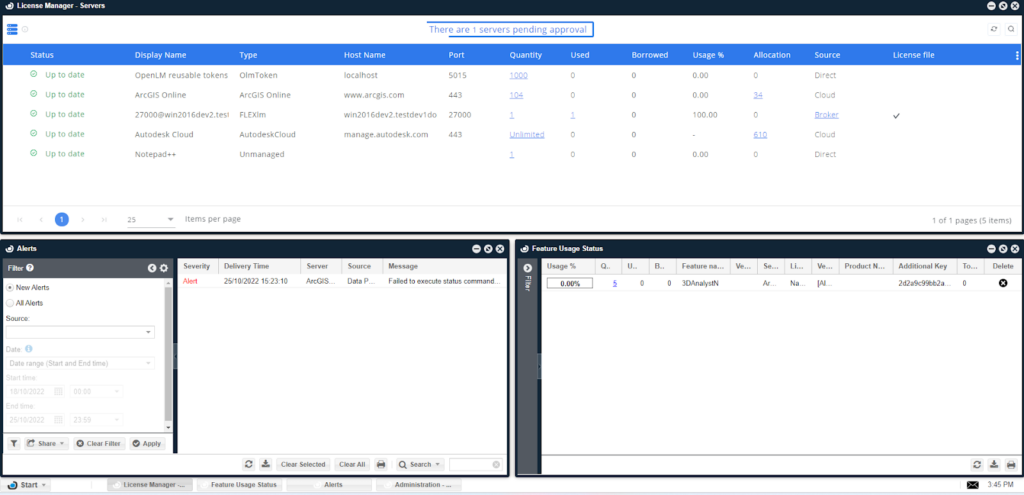
OpenLM is a robust software license management solution that provides businesses comprehensive visibility into their license software product usage. It excels in delivering deep insights through its advanced analytics, making it an ideal choice for organizations that need to understand intricate details about their software licenses.
Why I Picked OpenLM:
OpenLM became my list due to its impressive capabilities in turning complex license data into understandable and actionable information. Also, its ability to provide profound insights sets it apart, granting users a clear understanding of their license usage and compliance. It’s the best choice for organizations that must delve deep into their software licensing analytics.
Standout Features & Integrations:
OpenLM offers critical features for effective license management, including software license tracking, real-time usage reporting, and compliance management. Its license harvesting feature is particularly noteworthy, allowing organizations to reclaim and reallocate idle licenses, thereby optimizing license usage.
Regarding integrations, OpenLM seamlessly connects with a wide range of license managers such as Flexera FlexNet, IBM LUM, and MathML. It is compatible with license managers running on Unix, Linux, MacOS, and Windows Operating systems. It also supports integration with business-critical platforms such as Active Directory, helping to streamline license allocation based on user roles and departments.
Pricing:
Pricing starts from $2/user/month, with a minimum purchase of 20 seats required.
Pros
- Comprehensive analytics for deep insights
- Support for a wide range of license managers
- Active Directory integration for streamlined license allocation
Cons
- The steeper learning curve for non-technical users
- Minimal multi-language support
- Requires a minimum purchase of 20 seats
3. Snow - Best for large-scale enterprises seeking comprehensive coverage

Snow Software is a complete license management solution geared toward large-scale enterprises. This tool also offers an exhaustive range across the myriad software licenses a large enterprise might have to manage, justifying its place as a go-to for more giant corporations.
Why I Picked Snow:
Snow Software rose to the top in my selection process for its robust capabilities in managing software licenses across large and complex environments. Additionally, it gives stakeholders access to thorough analysis and decreases the administrative load for SAM program administrators. Its comprehensive coverage that simplifies the intricate task of license management in big enterprises sets it apart. I chose Snow as the best option for large-scale enterprises because it can efficiently oversee vast license portfolios.
Standout Features & Integrations:
Snow's standout features include automated compliance reports, license overuse alert notifications, software inventory, and detailed software lifecycle management. Another notable feature is its ability to discover and inventory software across the organization, including virtual, physical, and cloud environments.
As for integrations, Snow Software can connect with various third-party systems. It integrates with significant deployment systems such as Microsoft System Center Configuration Manager (SCCM), IBM BigFix, and ITSM platforms like ServiceNow and BMC Remedy.
Pricing:
Pricing for Snow Software is available for you, but it should be noted that the tool is built to cater to the demands of large-scale enterprises.
Pros
- Comprehensive coverage for complex environments
- Detailed software lifecycle management
- Extensive integration capabilities
Cons
- Pricing needs to be more transparent.
- It may be too complex for small businesses.
- Limited support for mobile devices
4. Coreview - Best for Office 365 license management and reporting
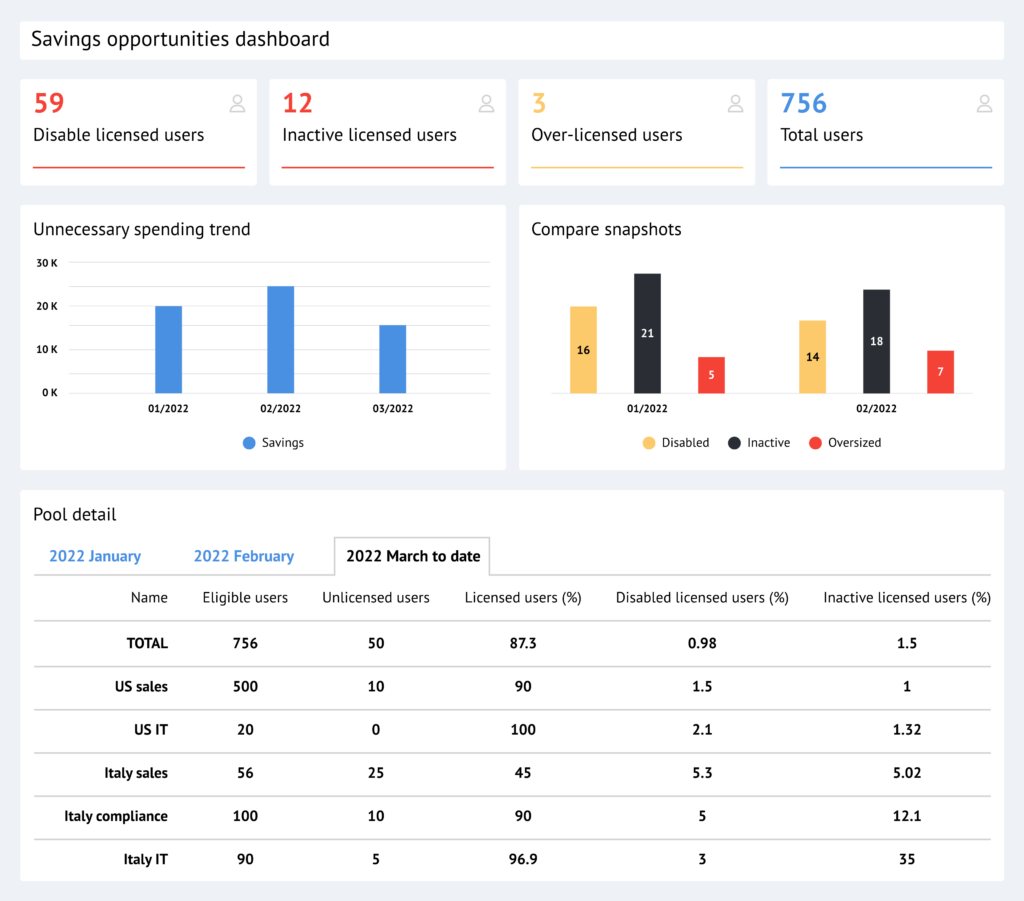
Coreview is a specialized license management software that manages and optimizes Microsoft Office 365 licenses. It provides robust reporting capabilities and granular control over rights, making it the top choice for organizations heavily invested in Office 365.
Why I Picked Coreview:
During my evaluation, Coreview stood out for its concentrated functionality around Office 365 license management. Moreover, its dedicated features for this specific ecosystem differentiate it from other license management tools. Given its comprehensive reporting and granular control, I selected Coreview as the best tool for organizations primarily using Office 365.
Standout Features & Integrations:
Coreviewalso excels in its detailed reporting, allowing users to gain insights into their license utilization, identify inactive licenses, and spot potential security risks. It offers features such as license recycling, which helps organizations avoid waste by reallocating unused permits.
Coreview is built to integrate with Microsoft's Office 365 ecosystem. It connects directly to the Azure Active Directory, providing up-to-date information and enabling detailed license assignments based on user roles.
Pricing:
Pricing for Coreview starts from $3.5/user/month, billed annually.
Pros
- Specialized in Office 365 license management
- Detailed reporting capabilities
- License recycling feature
Cons
- Pricing requires an annual commitment.
- Limited utility for non-Office 365 environments
- The interface might be overwhelming for beginners.
5. LicenseSpring - Best for software developers needing custom licensing solutions
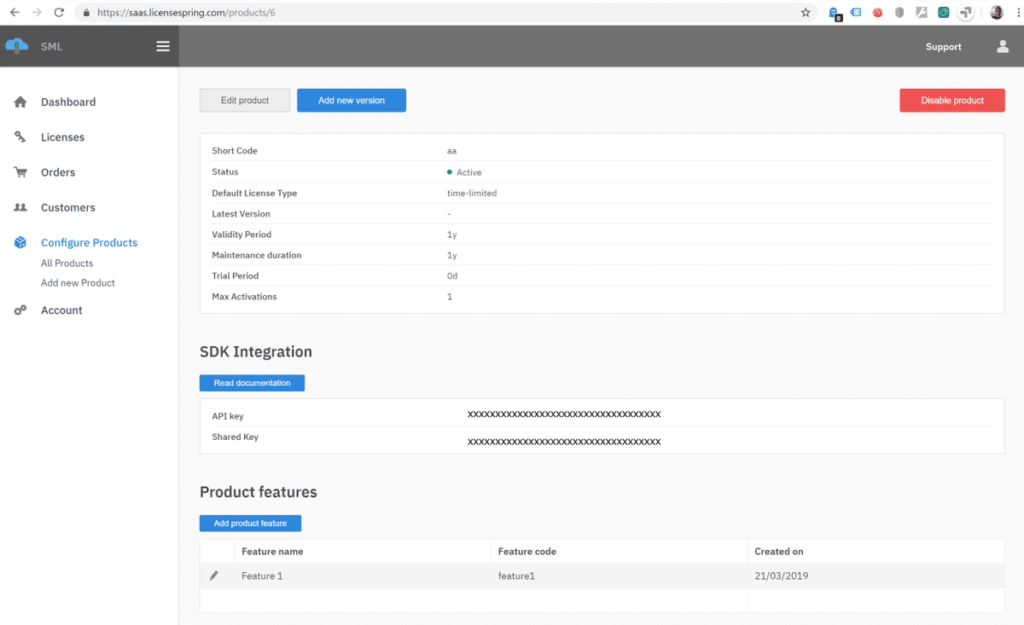
LicenseSpring is a unique license management platform that empowers software developers with custom licensing solutions. Its advanced toolset also provides flexibility and adaptability, making it a perfect fit for developers requiring bespoke software solutions.
Why I Picked LicenseSpring:
I chose LicenseSpring because it bridges the gap between standardized license management and custom needs often present in software development. Also, its core strength lies in providing developers the flexibility to create bespoke licensing solutions, making it a standout choice for custom software projects.
Standout Features & Integrations:
LicenseSpring allows developers to enforce license terms, manage renewals, and monitor license usage from within their software applications. It also features a centralized dashboard for managing all license activities and getting real-time analytics.
It integrates well with many standard payment gateways such as Stripe and PayPal, making it easier to handle transactions related to licensing. Additionally, it can be seamlessly integrated into your software through its robust API.
Pricing:
LicenseSpring offers a starting price of $50/month with an allowance of 500 active licenses.
Pros
- Highly flexible and customizable for developers
- Real-time analytics on license usage
- Seamless integration with standard payment gateways
Cons
- The pricing might be steep for smaller developers.
- A higher learning curve for non-technical users
- The interface could benefit from a modern redesign.
6. Soraco - Best for small businesses wanting affordability without compromising functionality
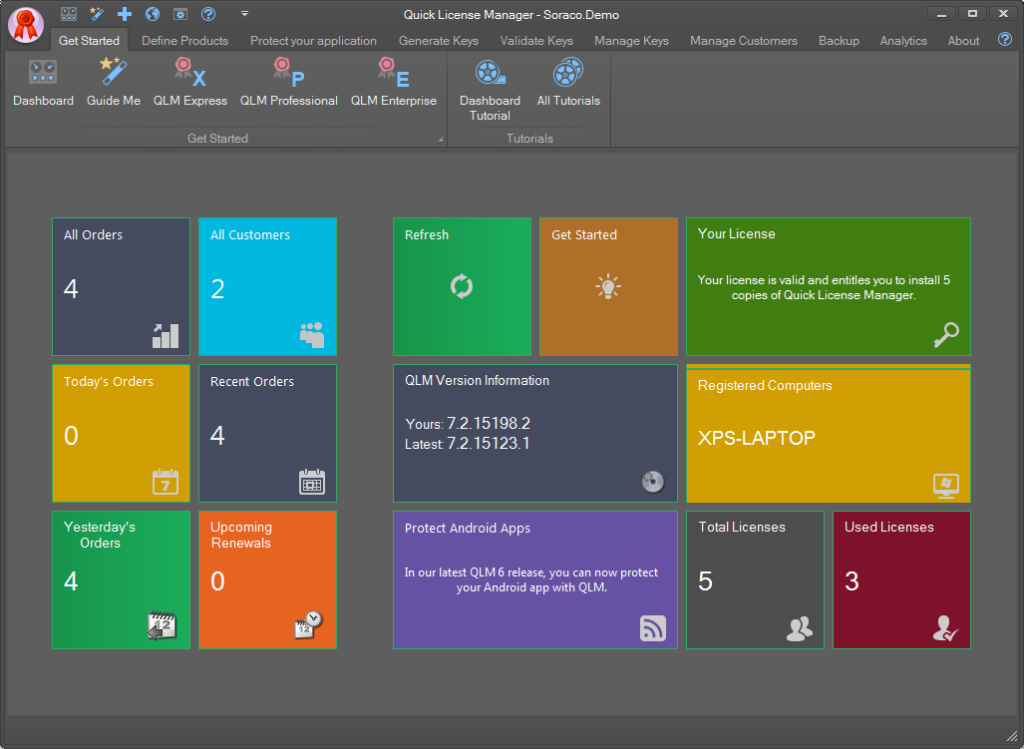
Soraco is a license management software that offers an intuitive yet potent suite of tools. Targeting small businesses provides a cost-effective solution that doesn't compromise functionality also making it an ideal choice for companies on a budget yet requiring a comprehensive licensing system.
Why I Picked Soraco:
Soraco made it onto my list for its balance of affordability and comprehensive functionality. In a landscape where many license management systems can be costly, Soraco also provides a robust feature set at a more manageable price, making it a desirable option for small businesses.
Standout features & integrations:
Soraco features include offline activation, pay-per-use licensing, and license reactivation - critical capabilities for flexible and dynamic license management. Moreover, it provides a cloud-based license server, making it a good fit for businesses using cloud infrastructure.
Soraco integrates with various common e-commerce platforms, payment providers, and ERP systems, allowing businesses to incorporate license management into their existing workflows.
Pricing:
Soraco pricing starts from $15/user/month. This is an estimated cost as they provide custom pricing based on your specific needs.
Pros
- Affordable pricing is ideal for small businesses.
- A broad range of licensing capabilities
- Seamless integration with common ecommerce platforms and ERP systems
Cons
- The lack of a clear, standardized pricing structure may deter some businesses.
- Less suitable for larger enterprises with more complex requirements
- It may require some technical know-how for maximum utility.
7. Altair - Best for dynamic data center and cloud environments
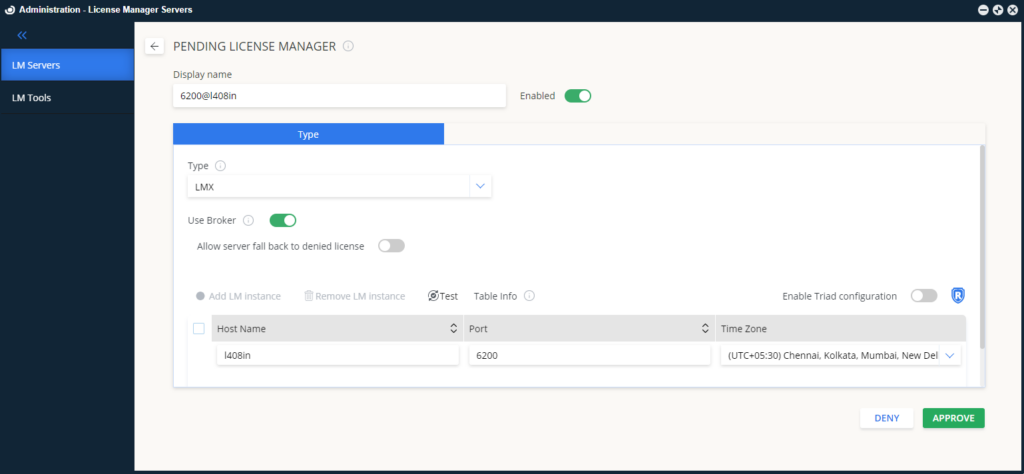
Altair offers an advanced licensing management solution with a solid approach to handling complex and dynamic environments. This system also caters to the data center and cloud environments, justifying its position as a top pick for organizations operating within these scopes.
Why I Picked Altair:
I chose Altair because it emphasizes data centers and cloud-based environments. These specific environments require flexibility and adaptability, and Altair seemed to nail this requirement. I deemed it "Best for dynamic data center and cloud environments" because it could support and adapt to these specific and complex needs.
Standout features & integrations:
Altair has robust features such as real-time license tracking, advanced analytics, and detailed reporting. All these functionalities are tailored to adapt dynamically to the needs of data centers and cloud environments. Furthermore, the ability to borrow licenses ensures optimal utilization across various locations and systems.
On the integrations side, Altair shines by supporting a broad spectrum of enterprise applications and platforms. This is especially useful in cloud and data center contexts where a diverse range of systems and software is often in play.
Pricing:
Pricing for Altair is available upon request. While there is no clear starting price, it is likely due to their client base's unique and varied needs, especially those operating in dynamic data centers and cloud environments.
Pros
- Tailored for dynamic data center and cloud environments
- Advanced features including real-time license tracking, analytics, and reporting
- Supports a broad spectrum of enterprise applications and platforms
Cons
- Pricing information is not readily available.
- It could be overly complex for businesses with less complicated needs.
- The process of obtaining a price quote might be time-consuming.
8. InvGate - Best for inventory tracking and PC management
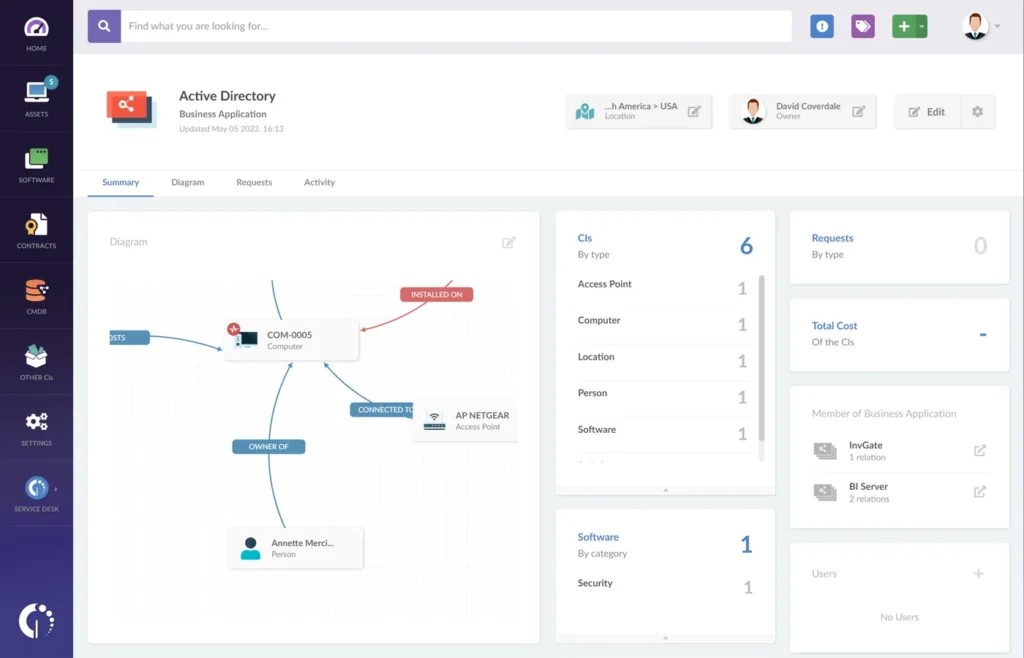
InvGate is a comprehensive software license management tool that offers advanced inventory tracking and PC management features. Its combined capabilities make it an ideal choice for businesses needing an agency that handles more than just software licenses.
Why I Picked InvGate:
When selecting a tool that combines inventory tracking and PC management with licensing solutions, InvGate stood out for me. Integrating these functions into one unified platform gives it an edge over other options. Its ability to provide multi-faceted functionality led me to designate it as "Best for inventory tracking and PC management."
Standout features & integrations:
InvGate shines with features that go beyond license management. The inventory tracking capabilities provide real-time insights into resource allocation and usage. The PC management feature also enables control over software distribution and ensures compliance.
InvGate integrates well with various IT management tools and systems, facilitating better control and synchronization across different platforms. This makes it a versatile choice for businesses with diverse IT infrastructures.
Pricing:
The pricing for InvGate starts from $20/user/month. This makes it an accessible solution for businesses that seek comprehensive functionalities. I want to let you know that the pricing could vary depending on your operations' specific needs and scale.
Pros
- Offers inventory tracking and PC management in addition to license management
- Provides real-time insights into resource allocation and usage
- Seamless integration with various IT management tools and systems
Cons
- The breadth of features may be overwhelming for some businesses
- It could be overkill for businesses seeking simple license management.
- Higher starting price compared to more basic solutions
9. 10Duke - Best for cloud-based licensing and user authentication
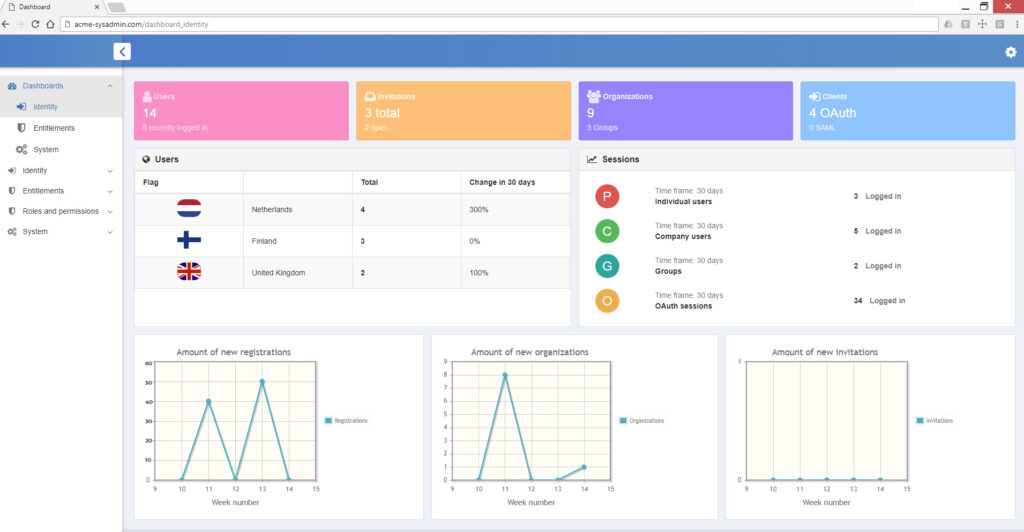
10Duke offers cloud-based licensing and user authentication, supporting software providers in managing their apps efficiently. Its functionality is handy for those operating in the cloud. Hence, it perfectly matches businesses wanting cloud-oriented licensing and authentication solutions.
Why I Picked 10Duke:
The reason I picked 10Duke is that it uniquely combines cloud-based licensing with user authentication. The tool's dual capability also allows software providers to manage their licenses and user access better. That's why 10Duke is best for those who want a cloud-based tool for managing licensing and user authentication.
Standout features & integrations:
10Duke's features extend beyond typical license management to include user authentication, providing an extra layer of security for businesses. Its cloud-based nature also means it is highly scalable and adaptable, suitable for businesses of varying sizes.
Regarding integrations, 10Duke is compatible with a wide array of platforms and systems, allowing businesses to incorporate the tool into their existing setup seamlessly. This extends the utility such as 10Duke, making it a flexible choice for various business types.
Pricing:
Pricing for 10Duke starts from $15/user/month. This pricing makes it an accessible option for businesses operating on a tight budget. Just so you know, this is a starting price, and costs may scale based on the specific requirements of your business.
Pros
- Cloud-based for scalability and adaptability
- Combines licensing management with user authentication
- A wide array of integrations with existing systems
Cons
- It may be more complex than standalone licensing tools.
- The extra functionality could come with a learning curve.
- Some businesses may not require the added user authentication functionality
10. AssetSonar - Best for asset tracking and lifecycle management
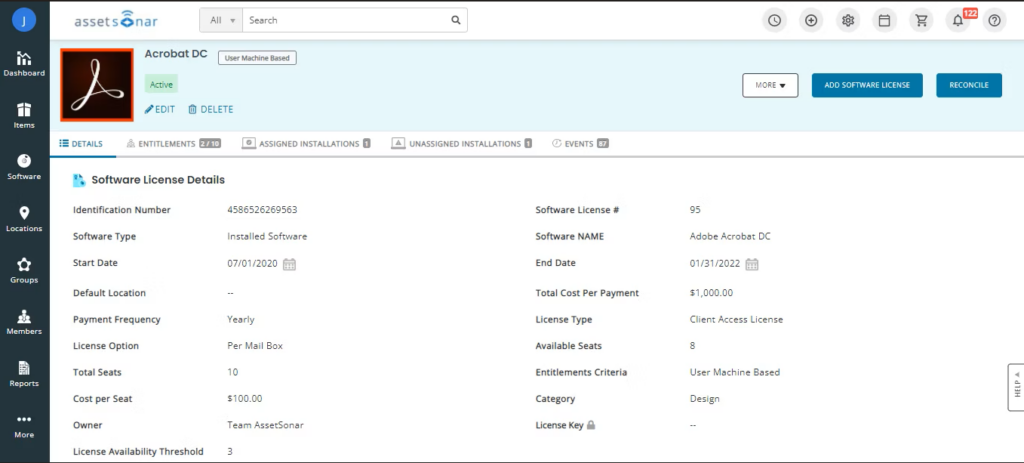
AssetSonar is a robust IT asset management software (ITAMS) tool that offers comprehensive asset tracking and lifecycle management, enabling businesses to keep close tabs on their physical and digital assets. It is especially adept at managing asset lifecycles, making it an optimal choice for companies needing in-depth tracking and managing assets throughout their lifespan.
Why I Picked AssetSonar:
I selected AssetSonar because of its exhaustive approach to asset tracking and management, which extends to the lifecycle of an asset. This breadth of focus offers a holistic view of an organization's assets, which is crucial for efficient asset utilization. Also, the depth of its lifecycle management capabilities makes AssetSonar an excellent choice for organizations focusing on end-to-end asset management.
Standout features & integrations:
AssetSonar's features provide comprehensive insights into assets' current status, history, and future projections. The tool includes valuable functions such as maintenance management, depreciation tracking, and audit trails, forming a complete asset management system.
AssetSonar also integrates smoothly with common platforms like Zendesk, which enhances its utility by enabling it to work with other tools in an organization's ecosystem.
Pricing:
AssetSonar pricing begins from $29.99/user/month, making it an accessible option for businesses seeking a comprehensive asset management solution. Just to remind you, this starting price may increase based on specific needs or additional functionalities.
Pros
- Offers comprehensive asset tracking and lifecycle management
- Integrates with common platforms like Zendesk
- Provides detailed insights into asset status and history
Cons
- It may be more complex than more straightforward tracking tools.
- The in-depth features may come with a steep learning curve.
- It could be overkill for businesses with less complex asset management needs.
11. ManageEngine ServiceDesk Plus - Best for IT service desk integration
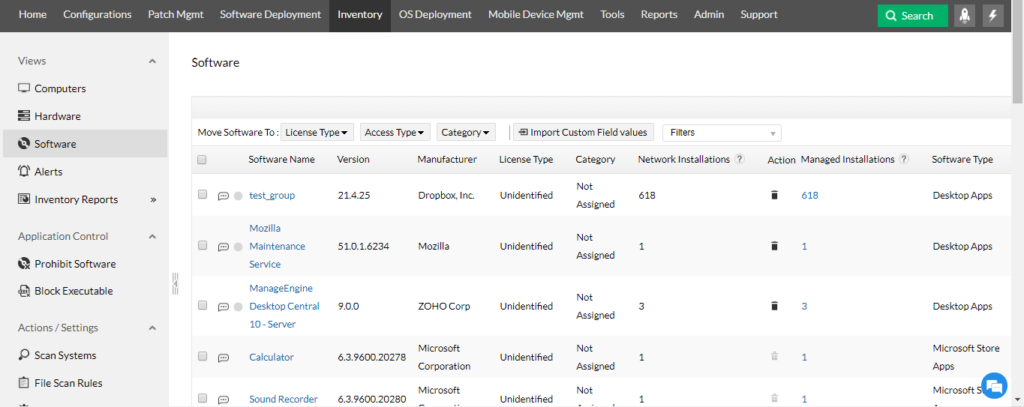
ManageEngine ServiceDesk Plus is a tool that provides an all-inclusive IT service management (ITSM) solution. It also integrates with existing IT service desks, enhancing their functionalities and extending their capabilities, making it an optimal choice for organizations looking to upgrade their existing IT service desk infrastructure.
Why I Picked ManageEngine ServiceDesk Plus:
I chose ManageEngine ServiceDesk Plus due to its well-rounded approach to IT service management. It considers the various aspects of ITSM and ensures a smooth integration with existing IT service desks. This focus on integration without disrupting existing services makes ManageEngine ServiceDesk Plus stand out and is the rationale for its selection as the best IT service desk integration.
Standout features & integrations:
Among the many features of ManageEngine ServiceDesk Plus, its ability to support incident, problem, change, and project management is notable. These functionalities can also transform the way organizations handle their ITSM.
The tool offers key integrations with software such as Zoho Analytics, Zoho Projects, and Zoho Desk. These integrations enhance its functionality and make it a more effective tool for managing an organization's IT services.
Pricing:
Pricing for ManageEngine ServiceDesk Plus begins from $10/user/month (billed annually), making it a cost-effective solution for organizations aiming to streamline their ITSM.
Pros
- Comprehensive ITSM solution
- Smooth integration with existing IT service desks
- Critical integrations with software like Zoho Analytics and Zoho Desk
Cons
- It could be complex for small organizations.
- The extensive features may require additional learning.
- The minimum number of seats could be a limitation for smaller teams.
12. Sentinel Software License Management - Best for flexibility in deployment options
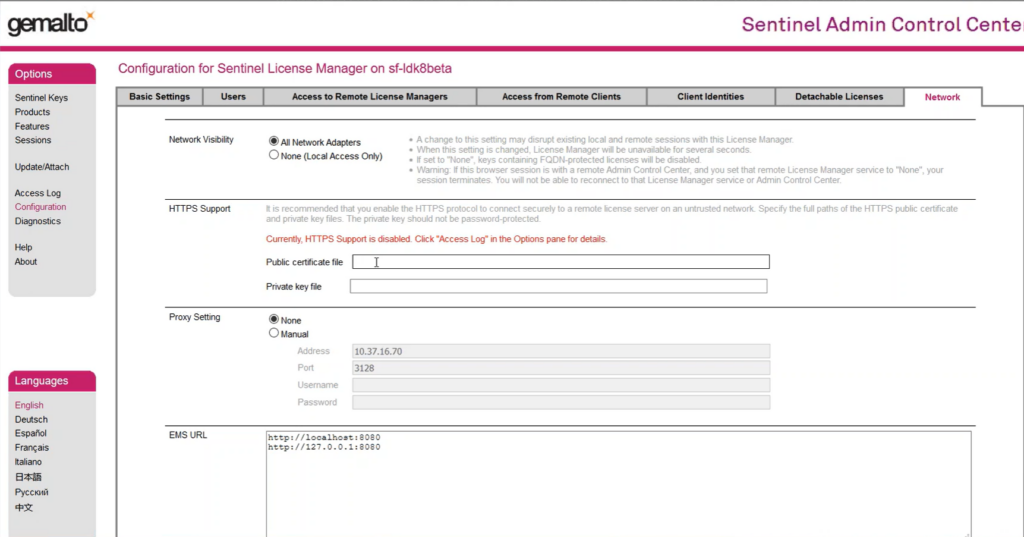
Sentinel Software License Management is a robust solution providing extensive flexibility in business deployment options. It allows users to manage software licenses across various systems and devices, making it a fitting solution for organizations requiring versatile deployment options.
Why I Picked Sentinel Software License Management:
I chose Sentinel Software License Management for its unique versatility in deployment options. Unlike many other solutions, Sentinel provides the freedom to manage software licenses across various systems, which is uncommon in this industry. This distinctive feature makes it stand out and underpins my belief that it's best for flexibility in deployment options.
Standout features & integrations:
Sentinel offers a comprehensive set of features, such as its License Harvesting, which ensures optimum usage of licenses, and its detailed reporting and analytics function, which provides insights into license usage and management.
While Sentinel Software License Management doesn't heavily focus on integrations, its robust standalone features and ability to work across various platforms compensate for this. Its cross-platform functionality gives organizations a unified view of their licenses, regardless of where they are deployed.
Pricing:
The Sentinel Software License Management pricing starts at around $15/user/month, but this might vary depending on the specific deployment needs. It is best to contact their sales team directly for the most accurate pricing.
Pros
- Broad flexibility in deployment options
- Comprehensive license management features
- Detailed reporting and analytics function
Cons
- The pricing can be a bit complex due to variable deployment options.
- Lack of significant integrations with other platforms
- It may have a learning curve for first-time users.
13. Freshservice - Best for integrating license management with other ITSM processes
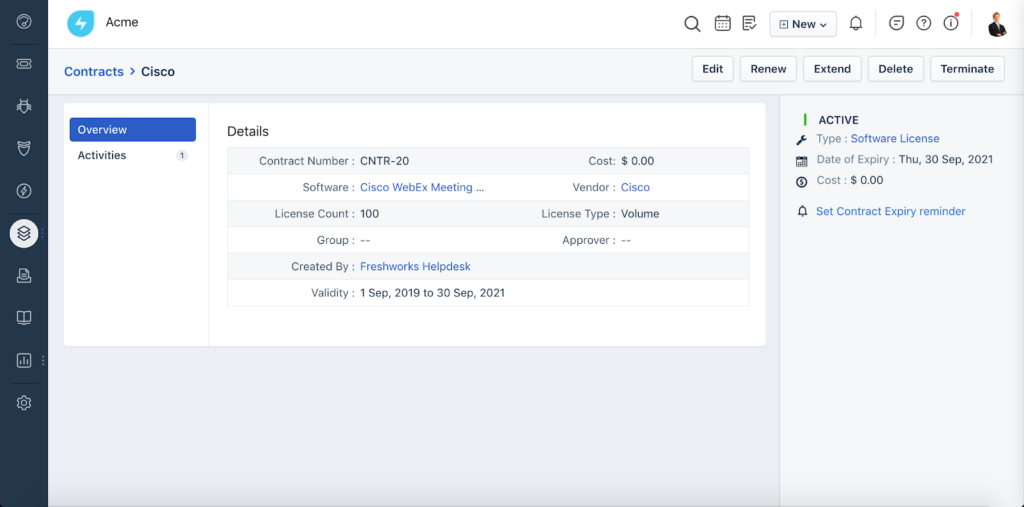
Freshservice is a comprehensive IT service management tool that combines ITSM processes with software license management. It caters to businesses of various sizes, making it an ideal solution for those who seek to integrate license management with other ITSM procedures.
Why I Picked Freshservice:
Freshservice quickly became a contender due to its ability to weave license management into the broader tapestry of ITSM processes when deciding on which tool to include on this list. This level of integration is not commonly found in other devices and sets Freshservice apart. It’s best for integrating license management with other ITSM processes due to this unique feature.
Standout features & integrations:
Freshservice offers a variety of features that help manage software licenses, such as Discovery and Asset Management, which tracks and manages all assets in your organization. Another key feature is the Service Catalogue, which allows you to create and publish available services.
Freshservice shines with its robust integration capabilities. It seamlessly integrates with popular platforms like Google Workspace, Slack, and Jira, thus allowing users to streamline their workflows.
Pricing:
Freshservice's pricing starts from $19/user/month (billed annually). This is the starting price for their lowest-priced paid plan, known as the 'Blossom' plan.
Pros:
- Integrates software license management with ITSM processes
- Offers robust integration with popular platforms
- Feature-rich with functionalities like Discovery and Asset Management
Cons:
- Pricing could be high for small businesses.
- Some users may find the interface to be more intuitive.
- The tool's broad scope may be more than what some businesses require
Other Noteworthy License Management Software
Below is a list of additional license management software I shortlisted but did not make it to the top 12. Definitely worth checking them out.
- EZOfficeInventory - Good for real-time asset tracking across locations
- Jira Service Management - Good for streamlining IT service requests with comprehensive workflows
- Reprise License Manager (RLM)- Good for large-scale software deployment with robust license tracking
- C2 ITSM - Good for managing IT services and assets with a focus on service delivery
- Nexthink - Good for optimizing software assets with powerful analytics
- keygen - Good for developers seeking a simple API-based licensing solution
- Total Network Inventory - Good for managing network assets with automated audits
- Sastrify - Good for IT teams seeking to streamline software procurement and budgeting
- Codemeter - Good for secure management of software and product licenses
- License Manager - Good for developers needing a versatile licensing system for their applications
- Zentitle - Good for automating licensing and end-user entitlement processes
- Agilis - Good for software companies seeking a flexible licensing platform
- SolarWinds Service Desk - Good for integrating IT service management with license tracking
- Vitado - Good for cloud-based asset management with real-time updates
- VIZOR License Manager - Good for reducing software expenditure with effective license optimization
- Cryptlex - Good for implementing a secure, cloud-based license management solution
- Acresso (Flexera) Software Manager - Good for large organizations needing comprehensive software asset management
- IBM License Compliance Manager - Good for ensuring legal compliance with automated license tracking
Selection Criteria for Choosing License Management Software
I've tested dozens of options in the quest for the perfect software license management tool. Each device came with its unique strengths, but I was primarily looking for specific functionalities that make license management efficient, understandable, and cost-effective.
Core Functionality:
The core function of a software license management tool should be to:
- Provide real-time tracking and management of all software licenses in use.
- Ensure compliance with the licensing agreements.
- Optimize the use of licenses to avoid overprovisioning and unnecessary costs.
- Offer actionable insights through reporting and analytics.
- You can make the management process easier wherever possible.
Key Features:
For this selection process, I focused on the following key features:
- Compliance Management: Tools should have an integrated system to manage software license compliance with licensing agreements and avoid legal complications.
- License Optimization: A practical tool should analyze software usage patterns and suggest optimizations to avoid waste of resources.
- Real-time Tracking: The tool needs to track licenses in real time to offer accurate inventory and usage data.
- Reporting and Analytics: The tool should offer detailed reports and analytics on license usage, compliance, costs, and more.
- Integration: Seamless integration with other ITSM processes and tools is essential for holistic IT management.
Usability:
With usability, I paid attention to the following:
- Intuitive Interface: The tool should have an easy-to-navigate interface with precise categorizations and easily accessible functions.
- Quick Onboarding: The learning curve for using the tool should be minimal, with resources for fast onboarding, such as tutorials, walkthroughs, or a knowledge base.
- Robust Customer Support: Given the critical nature of license management, prompt and efficient customer support is vital.
- Customizable Views: The tool should offer customizable views and filters for managing licenses to cater to user preferences and needs.
Most Asked Questions Regarding License Management Software (FAQs)
What are the benefits of using license management software?
License management software offers a plethora of benefits:
- Compliance Management: These tools help ensure your organization is adhering to licensing agreements, thus avoiding potential legal and financial penalties.
- Cost Savings: By tracking software usage, these tools allow organizations to optimize their software licenses and avoid overprovisioning and unnecessary expenditures.
- Improved Visibility: Real-time tracking provides a clear view of what software is in use, how often, and by whom, facilitating better decision-making.
- Automated Processes: These tools can automate various processes, such as renewals and audits, reducing manual effort and human error.
- Integration: Most of these tools seamlessly integrate with other ITSM processes and tools, providing holistic IT management.
How much do license management tools typically cost?
The cost of license management tools can vary significantly based on their complexity, features, and size.
What are the pricing models for license management tools?
Most license management tools follow a subscription pricing model, usually charged monthly per user. This can be tiered based on the features and capabilities available at different price points. Some tools may also charge a base fee or a one-time setup fee.
What is the typical range of pricing for these tools?
Prices can range anywhere from $10/user/month for entry-level tools to hundreds of dollars per user per month for comprehensive, enterprise-level solutions.
Which are the cheapest and most expensive license management software?
The cheapest tool I found was Keygen, starting from $20/user/month, while the most expensive one can be a comprehensive solution like IBM License Compliance Manager, which can go well above $100/user/month.
Are there any free license management software options?
Yes, some tools do offer a free version or a free trial. However, these usually come with limited features and capabilities. You would typically need to move to a paid plan for full-featured versions.
More License Management Software Reviews
Summary
In conclusion, choosing the right license management software requires a thoughtful evaluation of your organization's needs, the software's core functionalities, key features, usability, and pricing. This guide should provide a comprehensive framework to help you in this process.
Here are the key takeaways from the guide:
- Please understand your needs: Your organization's needs should decide your wants. Are you a small business that requires basic functionality or an enterprise needing an extensive feature set? Would you need a tool that integrates well with your existing ITSM processes? Answering these questions will help narrow down your options.
- Evaluate Key Features: Different tools have different strengths. Some offer great flexibility in deployment, others excel in integrating with other ITSM processes, and others provide robust automation features. Could you make sure the software you choose aligns well with your priorities?
- Consider the Pricing: Budget is a significant factor in any software procurement decision. Consider not just the per-user per-month cost but also any setup or base fees, the pricing model, and whether the tool offers a free version or trial.
Ultimately, the best license management software is the one that meets your specific needs and fits within your budget. Following this guide, you should be well-equipped to make an informed decision.
What do you think?
Of course, the world of license management software is vast and ever-evolving. While I've done my best to provide a comprehensive list, I've missed a tool that you find indispensable. I will love to hear from you if you have suggestions for license management tools that should be on this list. Please feel free to share your recommendations and insights. Your feedback will undoubtedly benefit others searching for the perfect license management software.
